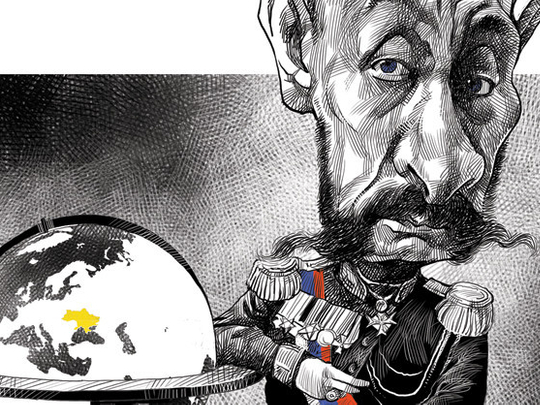
Russian President Vladimir Putin has outraged international law by annexing Crimea. After manipulating Ukraine’s region of Crimea to vote in favour of independence and getting the support of the compliant Russian parliament, large crowds of Russians cheered Putin’s fiercely patriotic address on Tuesday when he signed a treaty marking Crimea’s accession to the Russian Federation.
Russia’s blatant territory grab goes against almost a century of international affairs defined by the key principle of self determination and sovereign boundaries, but Putin knows that all this happened before and if Russia could get away with it under Tsar Alexander II in 1870, why should Putin not hope for the same in 2014?
It is easy to see Putin wanting to be compared to the all-powerful Alexander II who was also Russia’s leading reformer, but it is disturbing that US President Barack Obama’s low-key response to the crisis matches the actions of liberal British prime minister William Gladstone, dealing with an interventionist legacy of Lord Palmerstone, much the same as George W. Bush’s legacy to Obama.
In 1870, Russia unilaterally rejected the Treaty of Paris, which the defeated Russia had signed in 1856 at the end of the Crimean War when it was forced to recognise the neutrality of the Black Sea. Russia’s rejection of this neutrality in 1870 led to popular fury in Britain and the jingoistic British press assaulted prime minister William Gladstone shouting that “national honour was at stake”. He was implored to prepare troops, escalate the situation and take action to defend international law.
However, speaking at the height of the crisis in 1870, Gladstone took the view that “the arrangement of 1856 was too impractical to uphold”. The Liberal prime minister was deeply critical of the aggressive policies of his predecessor Lord Palmerstone. Gladstone was supported by the influential political thinker John Stuart Mill who argued that the Treaty of Paris should have been allowed to fall into disuse and was a “legacy of the evil Palmerstonian days”.
Territorial expansion
It was during this crisis that the very pragmatic Mill defined his two key rules for international treaties, which are still quoted today. First, any treaty should abstain from imposing conditions that under “any just and reasonable view cannot be expected to be kept” and second, that any treaty should be concluded for a limited period of time and should never be expected to last forever.
Today’s Putin sees himself as rebuilding Russia for the 21st Century and he will enjoy any comparison with Alexander, as he combined re-shaping the Russian state with rampant territorial expansion. Alexander was fiercely acquisitive and had conquered new territories in Siberia, the Caucasus and Turkestan (roughly contiguous with present-day Kazakhstan and Uzbekistan).
At the time, Russia also ruled Poland as a separate entity and Tsar Alexander was also King of Poland. The most obvious similarity to today’s crisis is how Alexander responded to the Polish uprising in 1863 when the Poles sought independence from the Russians. Alexander ended Poland’s separate constitution, annexed Poland into Russia and sent thousands of Poles into exile and prison in Siberia. This is not a good precedent for any of today’s Ukrainian nationalists left in Crimea.
Although the comparison between 1870 and 2014 illustrates Russia’s eternal desire to give itself a powerful role in global affairs, there can be no direct comparison as the structure of international law has changed totally. The old Victorian politics based on pragmatic balance of power have given way to the 20th Century’s conviction politics, in which the sovereignty of states and the rule of law are fundamental.
The world has become completely inter-connected, making it impossible for any one nation to go it alone. It is no longer true (if it ever was) to say that every man is an island and apply the same thought to nation states. Complete and absolute national sovereignty is no longer possible, as every modern nation must bind itself into a complex mesh of international treaties and understandings that limits its right to do whatever it pleases.
Aggressive response
Obama and the European Union under Angela Merkel should use that mesh better to restrain Russia and that is why they are wrong not to formulate a much more aggressive international response to the loss of Crimea. It may be that the US Marines should not be steaming under some modern-day Lord Cardigan to the Crimea to mount another Charge of the Light Brigade, but the world has moved on since 1870 and there are other responses.
Obama and Merkel need to be much tougher on the military front, but also much more open to a new arrangement with Russia on the economic front.
Putin’s opportunistic grab of Crimea is designed to hide the increasingly desperate economic situation in Russia, which must frustrate Putin’s view of himself as the heir to Russia’s imperial past. His economic problems also offer Merkel and Obama an opening through which to build a necessary new relationship with Russia.
See also A3








